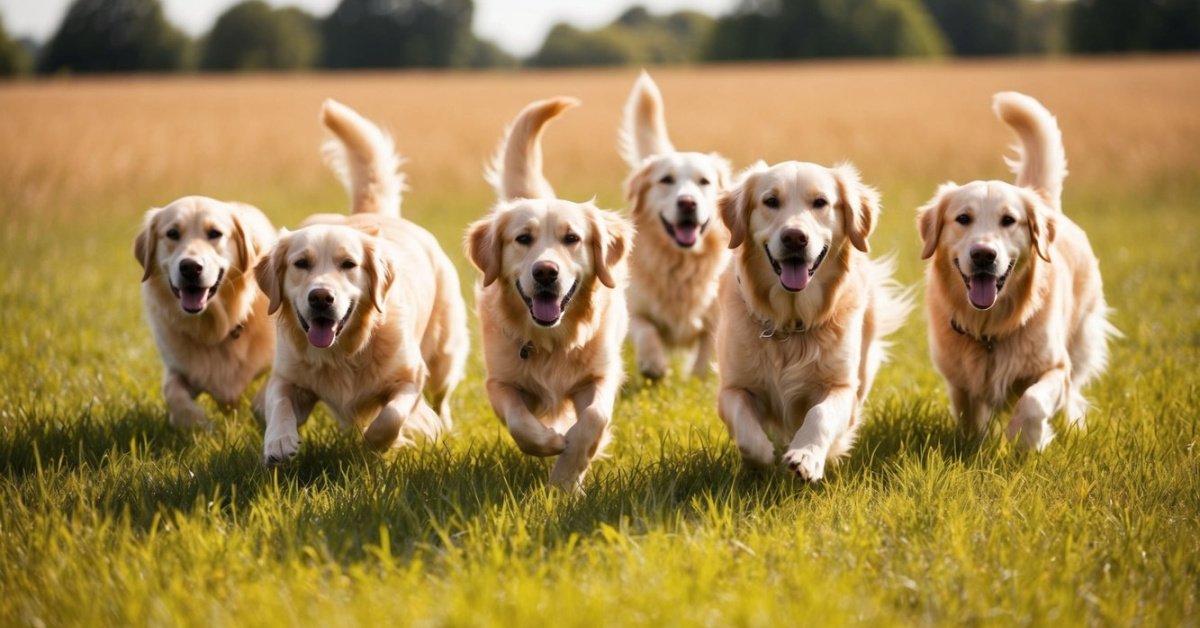When it comes to choosing a furry companion, Golden Retrievers often top the list for their friendly demeanor and loyalty. But if you’re wondering whether these lovable pups can double as effective watchdogs, you’re not alone. While their playful nature and eagerness to please make them great family pets, the question remains: how do they stack up in the guarding department?
I’ve always been fascinated by the balance between a dog’s temperament and its protective instincts. Golden Retrievers might not be the first breed that springs to mind when you think of a watchdog, but there’s more to their personality than meets the eye. Let’s dive into what makes these gentle giants tick and explore whether they can keep an eye on your home while still being the sweet companions we adore.
Overview of Golden Retrievers
Golden Retrievers excel as affectionate family pets, known for their friendly and loyal nature. Their playful demeanor and eagerness to please make them excellent companions. With a height ranging from 21 to 24 inches and weighing between 55 to 75 pounds, these dogs possess a sturdy build and a beautiful golden coat.
Intelligence defines Golden Retrievers, enabling them to learn commands quickly and engage in various activities. They thrive on social interaction and require daily exercise, making them suitable for families with active lifestyles. Golden Retrievers rank fourth in intelligence among dog breeds, as stated by the American Kennel Club.
Despite their amiable disposition, Golden Retrievers retain protective instincts. They may alert their owners to unfamiliar noises or visitors, showcasing their potential as watchful companions. Their kind temperament and non-aggressive nature often lead to them being perceived as approachable, rather than intimidating.
Overall, Golden Retrievers bring a unique blend of companionship and loyalty, offering both love and vigilance when needed.
Characteristics of Golden Retrievers
Golden Retrievers embody a unique mix of qualities that make them stand out. Their temperament and energy levels significantly influence their roles as companions and potential watchdogs.
Temperament
Golden Retrievers exhibit a friendly and gentle temperament. They’re known for their loyalty and affectionate nature, making them excellent family pets. Their eagerness to please often translates to a willingness to engage in various activities, from playtime with children to obedience training. Although they may not possess the aggressive traits typical of some watchdog breeds, they do show a strong protective instinct when it comes to their loved ones. When faced with strange noises or unfamiliar visitors, Golden Retrievers alert their owners, demonstrating their potential to be watchful companions despite their friendly demeanor.
Energy Levels
Golden Retrievers maintain high energy levels, requiring regular exercise and stimulation. They thrive in active environments, enjoying activities like fetch, hiking, and swimming. Daily exercise routines help manage their energy and contribute to their mental well-being. Engaging them physically and mentally fosters a well-rounded personality, allowing them to remain alert while retaining their playful spirit. This balance of energy and engagement can enhance their alertness to surroundings, further positioning them as viable options for watchful companions when cared for properly.
Watchdog Qualities
Golden Retrievers possess a unique blend of traits that can contribute to their effectiveness as watchdogs. Their friendly demeanor, coupled with instinctive protective traits, makes them interesting candidates for this role.
Barking Behavior
Golden Retrievers typically display moderate barking tendencies. They vocalize when they sense something unusual, but they don’t tend to bark excessively. This balanced barking behavior allows them to alert owners without being disruptive. A confident Golden can discern between everyday sounds and potential threats. When they bark, it’s often to notify me of an unfamiliar presence rather than to intimidate. Socialization exposes them to various noises, helping them differentiate between normal and concerning sounds.
Alertness to Strangers
Golden Retrievers maintain a natural curiosity about strangers. Their friendly nature allows them to assess new people without immediate aggression. When someone approaches, they often greet the newcomer with enthusiasm, yet they remain observant. If a stranger appears suspicious, a Golden Retriever’s protective instincts may kick in. They’ll position themselves between me and the unfamiliar person, suggesting vigilance in their approach to safety. Their ability to recognize familiar faces versus strangers enhances their potential as alerting companions.
Training Golden Retrievers as Watchdogs
Training Golden Retrievers as watchdogs involves consistent techniques and strategies to harness their natural instincts. Their intelligence and eagerness to please facilitate learning new skills, making training engaging and rewarding.
Basic Training Techniques
- Command Training: I start with basic obedience commands like “sit,” “stay,” and “come.” These foundational commands establish authority and create a responsive dog.
- Socialization: I expose my Golden Retriever to various environments, people, and animals early on. This helps them differentiate between friendly encounters and potential threats.
- Barking Control: Teaching “quiet” can minimize unnecessary barking. I reward my dog for calm behavior when someone approaches the home, reinforcing their alertness without excessive noise.
- Boundary Training: I establish clear physical boundaries, such as teaching them to stay in certain areas and be aware when approached by strangers. This builds their confidence regarding their territory.
Advanced Training Strategies
- Watchdog Commands: I incorporate specific commands like “alert” or “guard” to signal when my dog should be vigilant. Reward-based training encourages them to respond appropriately to these cues.
- Controlled Aggression Training: I work with a professional trainer to teach controlled responses to perceived threats. This ensures my Golden Retriever knows when to be protective without acting aggressively.
- Routine Simulation: I simulate scenarios where unusual sounds or visitors appear to practice their alertness. Reinforcing positive responses in these situations strengthens their role as a watchful companion.
- Continuous Reinforcement: I maintain regular training sessions, rewarding my Golden for displaying appropriate watchdog behaviors. Consistency in reinforcement solidifies their skills and responsiveness.
Utilizing these techniques and strategies enhances the Golden Retriever’s potential as a capable watchdog while maintaining their friendly demeanor and strong bond with me.

Pros and Cons of Golden Retrievers as Watchdogs
Pros
- Alertness: Golden Retrievers possess a natural ability to sense changes in their environment. They often bark to alert me of unfamiliar sounds or visitors, making them attentive watchdogs.
- Friendly Demeanor: Their friendly disposition allows them to assess new people without immediate aggression. They typically greet newcomers warmly while remaining observant, making them less likely to scare off potential guests.
- Protective Instincts: Despite their gentle nature, they show protective instincts when it comes to my family. If they perceive a threat, they may intercede between me and a stranger, demonstrating loyalty.
- Trainability: Golden Retrievers are highly trainable due to their intelligence. With consistent training techniques, I can enhance their protective capabilities while reinforcing their friendly behavior.
Cons
- Not Aggressive: Golden Retrievers lack the aggressive traits found in traditional watchdog breeds. This may not deter intruders effectively, as they often prefer a non-confrontational approach.
- Moderate Barking: Their barking tendencies are moderate, which means they may not always alert me in cases of serious threats. While they do respond to unusual sounds, their alerts can be subtle.
- Social Nature: Their social nature can work against them as watchdogs. They might view intruders as potential friends rather than threats, which may lessen their effectiveness in protecting the home.
- Exercise Needs: High energy levels require regular exercise. If they don’t receive sufficient activity, they may become restless, potentially leading to unwanted behaviors that could distract them from their watchdog duties.
Conclusion
« Smart Tips for Feeding Golden Retrievers on a Budget: Healthy & Affordable Meals
How Golden Retrievers Changed Through History: From Hunting Aids to Beloved Family Pets »
Golden Retrievers truly are a unique blend of companionship and alertness. While they might not fit the traditional mold of a watchdog, their protective instincts and friendly nature can make them surprisingly effective in that role. I love how they balance their playful demeanor with a watchful eye on their loved ones.
With the right training and socialization, they can become reliable companions who alert us to potential dangers without being overly aggressive. It’s this combination of loyalty and gentleness that makes them such special pets. So if you’re considering a Golden Retriever, know that you’re not just getting a loving friend but also a potential guardian for your home.











